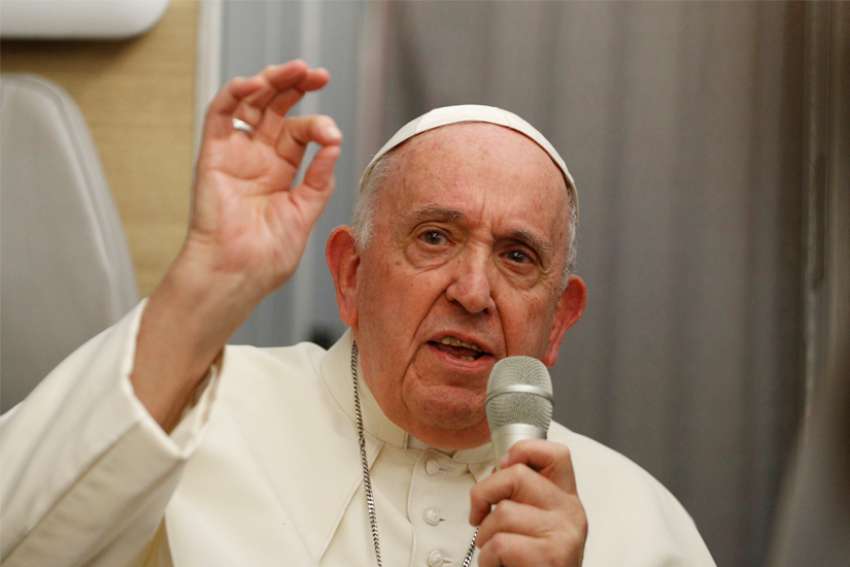Michael Swan
The Catholic Register
The Catholic Register was on scene with Pope Francis during his 'penitential pilgrimage' across Canada. See Michael's full reporting of the pope's historical visit.
It was genocide, plain and simple.
Pope Francis didn’t use the word when he apologized three times while touring Canada — in Maskawicis, Alta., Quebec and Iqaluit — for Catholic involvement in “cultural destruction” wrought by Canada’s residential school system for Indigenenous children. But asked about it on the flight home from Iqaluit to Rome, the Pontiff quickly agreed the g-word fit.
“Yes, genocide is a technical word, but I did not use it because I did not think of it. But I described — yes, it is a genocide, yes, yes, clearly. You can say that I said it was a genocide,” he said. “I asked for forgiveness for this genocidal work,”
The question, authored collectively by the Canadian journalists travelling with the Pope, was posed to Pope Francis by Indigenous reporter Brandi Morrin. She asked whether Pope Francis would use the word in a spirit of honesty, forthrightness and parrhesia.
The answer was, “Yes.”
The papal apologies issued in Quebec City and Iqaluit referred to “evil perpetrated by not a few Catholics who contributed to the policies of cultural assimilation.” The “not a few” wording was seen as an effort to blunt criticism that the first apology seemed to leave room for the “a-few-bad-apples” argument.
Catholic religious orders and dioceses ran about 60 per cent of the schools that separated 150,000 Indigenous children from their families, communities, language and traditions between 1881 and 1996. A tradition of Catholic entities taking collective responsibility for the damage done throughout the residential school history began with the Oblates of Mary Immaculate issuing an apology at Lac Ste. Anne in 1991.
A papal apology, to represent broader Catholic complicity in and support for the system, was sought by Canada’s Truth and Reconciliation Commission in Call to Action #58, issued in 2015.
Canadian reporters also asked whether Pope Francis had missed an opportunity by not saying something about the Doctrine of Discovery. Both in Quebec and Iqaluit, protest signs appeared asking Pope Francis to rescind the doctrine.
In this case, Pope Francis challenged the journalist to define the term.
Some journalists interpreted this as the Pope, perhaps not briefed on the issue, trying to avoid giving an answer. But Pope Francis hinted, as have several bishops travelling with the Pope in off-the-record conversations, that some sort of statement about the long history of Church involvement in colonialism is on the way.
After the Canadian questions, the press conference quickly veered off into other Vatican issues. Pope Francis reiterated that he hopes to travel to Kiev in the context of Russia’s invasion. He conceded his physical limitations make travel more difficult.
Asked about retirement, he again said that it is a matter of discernment.
“That wouldn’t be a catastrophe. You can change the Pope; that’s not a problem,” he said.
At the same time he said he’s not planning to retire.
Asked about serious Catholic arguments in favour of contraception, Pope Francis clearly didn’t want to stomp on theologians exploring the question.
“One cannot do theology with a ‘no’ in front of you,” he said.
It’s possible for Church doctrine to change and develop, he said. The Pope condemned “backward-thinking” traditionalists who fail to understand that tradition is supposed to be the means for going forward.



